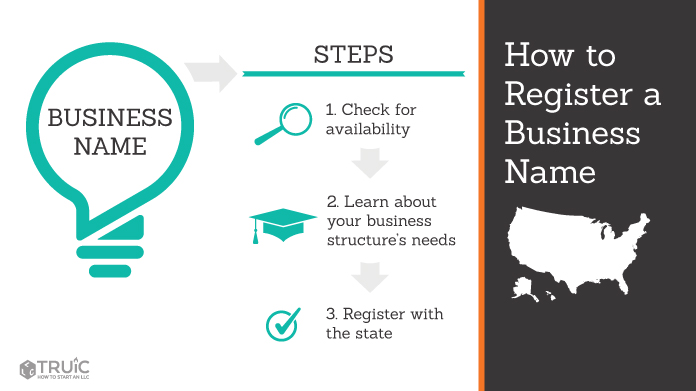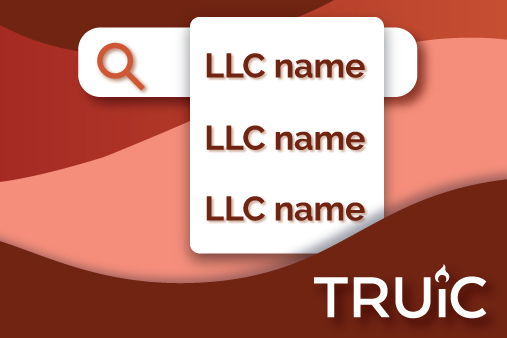How To Register A Business Name
To register a business name, you’ll need to register your business with the state. You can form an LLC or corporation, or file for a “doing business as” name with your state’s business division.
Our How to Register a Business Name guide will walk you through each step of the process.
Need help forming an LLC? Use Northwest for $29 (plus state fees).

Register a Business Name
Visit our state-specific register a business name guides to learn how to register a business name:
- Alabama
- Alaska
- Arizona
- Arkansas
- California
- Colorado
- Connecticut
- Delaware
- Florida
- Georgia
- Hawaii
- Idaho
- Illinois
- Indiana
- Iowa
- Kansas
- Kentucky
- Louisiana
- Maine
- Maryland
- Massachusetts
- Michigan
- Minnesota
- Mississippi
- Missouri
- Montana
- Nebraska
- Nevada
- New Hampshire
- New Jersey
- New Mexico
- New York
- North Carolina
- North Dakota
- Ohio
- Oklahoma
- Oregon
- Pennsylvania
- Rhode Island
- South Carolina
- South Dakota
- Tennessee
- Texas
- Utah
- Vermont
- Virginia
- Washington
- Washington D.C.
- West Virginia
- Wisconsin
- Wyoming
Recommended: If you don’t have a business name in mind or if yours is taken, check out our How to Name a Business guide or our free Business Name Generator tool. Then, create a logo with our free Logo Maker.
Business Name Search
The first search you will need to perform is a business entity name search, which is typically on your State’s Secretary of State website (e.g., Florida LLC Search). This is the most important step in the process because if you try to file for a name that is already taken, your filing will be denied.
Search requirements can vary depending on your business needs. For example, a unique and available name is required for:
- Filing for formal business structures like LLCs and corporations
- Filing a name reservation for an LLC or corporation before filing
- Filing a DBA for an existing business, both formal or informal
In some states, a state-level name search is not required for informal business structures like sole proprietorships or general partnerships. Choose your state from the dropdown above to see its rules.
Domain Name Search
We recommend that you check to see if your business name is available as a web domain (URL) too. Even if you don't plan to make a business website today, you may want to buy the web address to prevent others from acquiring it. It’s free to search.
Federal Trademark Search
Next, a quick search on the U.S. Trademark Electronic Search System will tell you whether someone else has already trademarked your name. Once you know the name is available, you can choose to apply for a trademark for your business, although the cost is sometimes too high for a startup or fledgling business.
Regardless of whether you will be registering a trademark, it’s good to know if your name is already taken.
To learn more about trademarks and the steps you will need to get one, read our How to Trademark Your Business Name guide.
Search the Web
Finally, when doing your research, it’s a good idea to check and see what else comes up when you search your prospective business name online on sites like Google, Bing, Yahoo, Yelp, Twitter, Facebook, Instagram, and more. Doing this will show you who else will show up on these platforms, whether they have a large online presence, and how tough they may be to compete with while you’re building your brand.
It’s also smart to see if anyone else in your industry already has a similar name to the one you want to use. You can do this by looking up some search terms related to your industry and brand. You may decide on a different business name to make yourself stand out.
Step 2: Determine Your Business Entity Naming Needs
Now that you know how to find a unique name, you’ll need to know what to do with one. This will be different based on your chosen business entity.
If you haven’t already chosen one, choosing the best business structure for your new venture is an important step because different business structures have different benefits, disadvantages, and naming rules.
Business structures can be formal or informal and are the way that your business is set up, operated, and taxed. We cover all the following naming needs for the following business structures:
Limited Liability Companies (LLCs)
An LLC, or Limited Liability Company, is the simplest way of structuring your business to protect your personal assets in case your business is sued. LLCs require unique names that must follow certain naming requirements, here are a few common ones:
- Your name must include the phrase “limited liability company,” or one of its abbreviations (LLC or L.L.C.).
Your name cannot include words that could confuse your LLC with a government agency (FBI, Treasury, State Department, etc.).
Restricted words (e.g. Bank, Attorney, University) may require additional paperwork and a licensed individual, such as a doctor or lawyer, to be part of your LLC.
Choose your state from the dropdown above to see a full list its LLC naming rules.
Common LLC Naming Scenarios:
What you will need to do with your LLC’s name depends on if you are already in business or are forming a new LLC. For step-by-step instructions of common LLC naming scenarios, skip ahead to:
Corporations
A corporation is a separate legal entity from its owners with a basic operational structure consisting of shareholders, officers, directors, and employees. A C corp business structure will protect your personal assets. Corporations require a unique name and must meet certain naming requirements, here are a few common requirements:
- Your name must contain the word “corporation,” “company,” “incorporated,” “limited” or an abbreviation of one of these terms.
- Your name must be distinguishable from any existing business in your state.
- Your name cannot include words that could confuse your corporation with a government agency (FBI, Treasury, State Department, etc.).
Choose your state from the dropdown above to see a full list its corporation naming rules.
Common Corporation Naming Scenarios
What you will need to do with your corporation’s name depends on if you are already in business, or are forming just forming the business. For step-by-step instructions of common corporation naming scenarios, skip ahead to:
Sole Proprietorships
A sole proprietorship is the simplest business type . A sole proprietorship is an informal business structure that doesn’t provide personal asset protection and does not need to be filed with the state.
This business structure must operate under the surname of the owner. To use a different name, the business owner must file for a DBA (Doing Business As).
Choose your state from the dropdown above to see a full list its sole proprietorship rules.
General Partnerships
General partnerships are similar to sole proprietorships. The difference is that a partnership consists of two or more people. A general partnership is an informal business structure that doesn’t provide personal asset protection.
General partnerships must include the surnames of the partners. To use a different name, business owners must file for a DBA (Doing Business As), known as an assumed name.
Choose your state from the dropdown above to see a full list its rules for partnerships.
Step 3: Register the Business Name
Now that you know your business name is unique, and what you want to do, here’s how to get the following actions done:
- Filing a Name Reservation
- Form a LLC
- Form a Corporation
- File a DBA for Existing Businesses
- Submitting an Amendment to the Legal Name of an Entity
Choose your state from the dropdown above to see the state-specific things you will need to do to register your business name.
Name Reservation
A name reservation is not required to be filed, in most states, to open a new company or file for a DBA.
However, there are benefits to filing a name reservation, like if you find a unique name for your business, but do not want to form your LLC or Corporation right away.
The procedures to reserve a business name vary state to state.
How to Form an LLC
Registering a business name is part of the LLC filing process: once your LLC is filed in the state, your name is registered. While the name can be reserved beforehand, this is typically not necessary to file for an LLC.
Forming an LLC is easy and only requires five simple steps:
- Naming Your LLC (If you’ve gotten this far, you should already be set!)
- Choosing a Registered Agent
- Filing the Articles of Organization
- Creating an Operating Agreement
- Getting an EIN
Recommended: Form an LLC using our free step-by-step guide, or have a professional service form your LLC.
How to Form a Corporation
Registering a business name is part of the corporation filing process: once your corporation is filed, your name is registered. While the name can be reserved beforehand, this is not typically necessary to file.
Forming a Corporation is easy, and only requires a few steps:
- Naming Your Corporation (If you’ve gotten this far, you should already be set!)
- Choosing a Registered Agent
- Choosing your Corporation's Initial Directors and Share Structure
- Filing the Formation Documents
- Getting an EIN
Recommended: Form a Corporation using Startup Savant’s free step-by-step guide, or have a professional incorporate your business.
How to File a DBA
Filing a DBA (Doing Business As) allows your existing or new business to do business as a name other than your legal business name. This can be helpful for getting a brand name established, or to change the name of a business without having to file an amendment to an original filing.
A DBA can be filed by all business structures covered in this article; however, LLC and corporation filing can sometimes be different than filing for sole proprietorships and general partnerships in some states.
Recommended: Read our guide on How to File a DBA.
Or, use a professional service to file your DBA for you.
Frequently Asked Questions:
How do you legally name a business?
To legally name a business, you will need to form a company with the desired name, file a DBA, or file an amendment to change its legal name.
How can I make my business name official?
Making a business name official requires forming a company with it, filing a DBA for an existing company, or submitting an amendment to the legal name of an existing business.
See how to do this above in step three of this guide.
What is a business legal name?
A business’s legal name is the official name of a business entity listed on the formation documents submitted and filed with the state. A legal name can be changed by filing an amendment to the business's formation documents.
A business can choose to operate under other names by filing for a DBA, also known as a trade name, fictitious name, or assumed name. Filing for a DBA does not change a business’s legal name.
What is the first step to starting a business?
The first step in starting a business is to choose the right business idea, followed by planning and forming your business. Learn how to start a business by reading our full, in-depth guide that discusses these subjects and more.
How much does registering a business name cost?
The cost of registering a business name is different depending on your needs and your state’s filing fees for reserving a business name, forming a company, filing a DBA, or filing a legal amendment to your business’s name.
Find your state in the dropdown above for more specific information.
How do you pay for a business name?
Paying for a business name is done when filing paperwork such as name reservations, formation documents, DBA filings, and legal amendments with the Secretary of State or responsible department in the state the business will be formed or exists in.
Does LLC have to be in a business name?
If a business is formed as an LLC, it is required to have some form of "limited liability company" in its legal name. This includes abbreviations such as "LLC," "llc," or "l.l.c.”
For more information on your state’s specific naming requirements, find your state in the dropdown above.
What happens if you don't renew your business name?
The result of not renewing your business name depends on how you registered the business name in the first place. If you reserved your name and didn't renew the reservation, the name will become available for anyone in that state to use.
If the business is either dissolved willingly or by going out of good standing, the name will also become available to use by others depending on state laws, unless reinstated.
Can I register a business name for free?
No. There are filing fee requirements for reserving a business name, forming a company with one, getting a DBA, and filing an amendment.
These fees vary by state. Find out more by selecting your state in the dropdown above.



